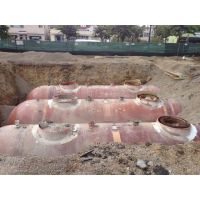BP Barred from Cleanup Fund and Pays Millions over Double-Billing Claims

British Petroleum North America agreed to pay $7.9 million after being accused by the state and a third party of double-billing California for underground storage tank (UST) cleanup reimbursements.
But the settlement could eventually cost BP up to another $135 million.
The latest saga of the serial polluter began in April 2010 when American Cost Recovery Management (ACRM) filed a lawsuit against BP in Sacramento County Superior Court alleging violations of the California False Claims Act. ACRM claimed BP was being reimbursed from a state fund that helps defray the cost of cleaning up unauthorized releases of petroleum from USTs while also collecting from insurance claims, litigation and settlements.
The State Water Resources Control Board (SWRCB), which administers the Barry Keene Underground Storage Tank Cleanup Fund Trust Act of 1989 (pdf), joined the settlement negotiations in 2012 with the state Attorney General’s Office.
Although BP denied all guilt or liability in the settlement, the company agreed that 90 of the 243 cleanup sites that had qualified for reimbursements would now be barred from the fund. BP, its insurers and whoever it can sue will now be responsible. The Water Board said that the average reimbursement is $500,000 per site, but some sites get the full $1.5 million.
That pencils out to savings of between $45 million and $135 million for the state.
The fund receives its money from UST operators, who pay a fee to the state Board of Equalization based on how much petroleum is placed in the tank. It is expected to be $2 billion short by 2016.
Last year, state lawmakers passed legislation to expand the cleanup program, provide better funding and extend it from 2016 to 2026. But that wasn’t necessarily a reward for a job well done. Senate staffers noted in an analysis of Senate Bill 445, “In recent years, program expenditures have exceeded revenues in part due to poor program oversight by the State Water Board, and in part due to unforeseen cost increases to clean up contaminated sites.”
There is no indication if those unforeseen cost increases included oil companies double-dipping.
California is in the process of replacing the most dangerous USTs. Around 12% of the them are “antiquated” single-walled tanks that present a “high risk of leaking gasoline, diesel fuels, fuel additives, and other hazardous substances into the soil and groundwater, posing a threat to human health and the environment,” according to the Senate staff. There are currently 2,000 of them and they must be replaced or removed by December 31, 2025.
In the 26 years since the cleanup law was passed, more than 43,000 leaks have been identified, according to KQED. Six out of seven have been addressed. That is not to say that 37,000 sites have been cleaned up. Often the goal is to stabilize the pollution at a non-threatening level and then let nature, and biodegradation, take its course.
A 2012 state report said the average time of remediation was 17 years.
–Ken Broder
To Learn More:
BP Double-Billed Government, Others for Clean-Up, State Says (Associated Press)
Black Mark for BP in California (Courthouse News Service)
California Fuel Leak Cleanup Rules Leave Lingering Spills to Nature (by Chris Richard, KQED)
Ninety British Petroleum Underground Storage Tank Sites Banned from Cleanup Reimbursement Following Legal Settlement (California State Water Board) (pdf)
- Top Stories
- Controversies
- Where is the Money Going?
- California and the Nation
- Appointments and Resignations
- Unusual News
- Latest News
- California Forbids U.S. Immigration Agents from Pretending to be Police
- California Lawmakers Urged to Strip “Self-Dealing” Tax Board of Its Duties
- Big Oil’s Grip on California
- Santa Cruz Police See Homeland Security Betrayal in Use of Gang Roundup as Cover for Immigration Raid
- Oil Companies Face Deadline to Stop Polluting California Groundwater





